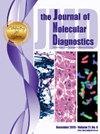对检测癌症同源重组缺陷的临床分子实验室的建议:分子病理学协会、癌症护理中心协会和美国病理学家学院的联合共识建议。
IF 3.4
3区 医学
Q1 PATHOLOGY
引用次数: 0
摘要
同源重组缺陷(Homologous recombination deficiency, HRD)是一些恶性肿瘤中存在的一种基因组特征,可归因于同源重组修复(Homologous recombination repair, HRR)途径的失败。hrd阳性状态的肿瘤可能具有不同的预后和/或对治疗的反应,包括聚(adp -核糖)聚合酶抑制剂(PARPi)。分子病理学协会组织了一个专家小组,审查目前的做法,并对与临床环境中HRD分子检测有关的医学文献进行范围审查。专家小组审查了以下主题:现有和拟议的HRD和基因组不稳定性生物标志物的组成部分(包括突变特征、杂合性丧失、hrr相关基因突变、RAD51C、BRCA1或BRCA2的表观遗传沉默);从肿瘤和种系NGS结果中识别基因组疤痕的技术考虑;报告基因组不稳定性和HRD评分评估时的解释和注意事项指南;以及HRD的临床意义。该小组制定了一套关于HRD分析设计和验证的专家共识意见建议,以指导实验室开发HRD测试,以确保高质量和可重复的结果。本文章由计算机程序翻译,如有差异,请以英文原文为准。
Recommendations for Clinical Molecular Laboratories for Detection of Homologous Recombination Deficiency in Cancer
Homologous recombination deficiency (HRD) is a genomic feature present in some malignant neoplasms and is attributed to the failure of the homologous recombination repair pathway. Tumors with an HRD-positive status may have a distinct prognosis and/or response to therapies, including poly (ADP-ribose) polymerase inhibitors. The Association for Molecular Pathology assembled an expert panel to examine current practice and perform a scoping review of the medical literature pertaining to the molecular detection of HRD in the clinical setting. The expert panel examined the following topics: components of existing and proposed HRD and genomic instability biomarkers (including mutational signatures, loss of heterozygosity, mutations in homologous recombination repair–associated genes, and epigenetic silencing of RAD51C, BRCA1, or BRCA2); technical considerations for identifying genomic scars from tumor and germline next-generation sequencing results; guidelines on interpretation and caveats when reporting assessments of genomic instability and HRD scores; and the clinical significance of HRD. The panel formulated a set of expert consensus opinion recommendations regarding HRD assay design and validation to guide laboratories in developing HRD tests to ensure high-quality and reproducible results.
求助全文
通过发布文献求助,成功后即可免费获取论文全文。
去求助
来源期刊
CiteScore
8.10
自引率
2.40%
发文量
143
审稿时长
43 days
期刊介绍:
The Journal of Molecular Diagnostics, the official publication of the Association for Molecular Pathology (AMP), co-owned by the American Society for Investigative Pathology (ASIP), seeks to publish high quality original papers on scientific advances in the translation and validation of molecular discoveries in medicine into the clinical diagnostic setting, and the description and application of technological advances in the field of molecular diagnostic medicine. The editors welcome for review articles that contain: novel discoveries or clinicopathologic correlations including studies in oncology, infectious diseases, inherited diseases, predisposition to disease, clinical informatics, or the description of polymorphisms linked to disease states or normal variations; the application of diagnostic methodologies in clinical trials; or the development of new or improved molecular methods which may be applied to diagnosis or monitoring of disease or disease predisposition.

 求助内容:
求助内容: 应助结果提醒方式:
应助结果提醒方式:


